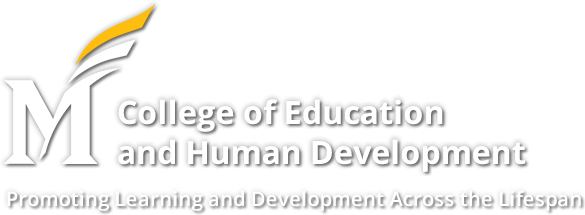College of Education and Human Development
Mason Professors Kick Up Teaching Techniques With NSF Grant
February 9, 2015

Anastasia Samaras
A George Mason University professor has a National Science Foundation (NSF) grant to help university professors step up their teaching game. What George Mason professors learn could be applied to universities nationwide.
The plan for the three-year $572,000 NSF grant is to close the “valley of death” between research on the latest learning techniques and moving that research into classrooms where students can benefit, says Jill Nelson, an electrical and computer engineering professor and study leader.
Science, technology, engineering and math (STEM) professors are working to find out what different approaches look like in disciplines from engineering to physics. They’re looking for best practices that work. The project is a collaboration between Mason’s Volgenau School of Engineering, the College of Science, and the College of Education and Human Development.

Lori Bland
“It’s proselytizing,” Nelson says. “We’re trying to get people to change their way of teaching––it’s a leap.”
Helping make that leap are group leaders: Cody Edwards, Provost’s Office/biology; Laura Kosoglu, civil, environmental, and infrastructure engineering; Craig Lorie, electrical and computer engineering; Mary Nelson, STEM Accelerator/math, Kathy Pettigrew, forensic science, Jessica Rosenberg, astronomy, and Reid Schwebach, STEM Accelerator/biology. They’re working with three education researchers from CEHD: Anastasia Samaras, professor and academic program coordinator for the Secondary Education 6-12 program; , associate professor of educational psychology; and Margret Hjalmarson, associate professor and academic program coordinator for the Mathematics Education Leadership program.

Margret Hjalmarson
The grant, Schwebach says, shows Mason is “at the cutting edge of advancing a new framework of faculty development and university instruction.”
It’s also giving Mason students insight into how to teach. Biology major Alex Johnson, who grew up in Manassas, plans to become a high school biology teacher. She says working with Schwebach on the notecard system, which uses 3-by-5 index cards to call on students in class, shows her how a simple Socratic method can boost student participation. The cards also track attendance, and Johnson is researching how card scores predict exam performances, so the instructor can help students get better grades.
This article was excerpted from the original on Mason News.
About CEHD
George Mason University's College of Education and Human Development (CEHD) includes two schools: the Graduate School of Education, one of the most comprehensive education schools in Virginia, and the School of Recreation, Health, and Tourism. CEHD offers a full range of courses, certificates, and degree programs on campus, online, and on site to more than 4,000 students each year. CEHD is fully accredited by NCATE, and all licensure programs are approved by the Virginia Department of Education. George Mason University, located just outside of Washington, DC, is Virginia's largest public research university.
For additional information:
- CEHD Communications: cehdnews@gmu.edu
- Graduate School of Education: gse.gmu.edu
Follow CEHD on Facebook at www.facebook.com/MasonCEHD or Twitter at @MasonCEHD.
